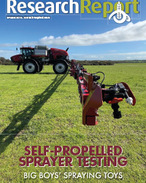This article is 2 years old. Images might not display.
Rabobank's latest quarterly Rural Confidence Survey, released today, revealed commodity prices and weather conditions are chief concerns for farmers and overall national rural confidence has dropped to the fourth lowest level in two decades.
Of those farmers reporting a negative outlook, 60 per cent cited lower commodity prices as a concern compared to 56 per cent in the previous quarter. Drought was also a growing worry for those with a negative outlook, nominated by 32 per cent, compared with 20 per cent previously.
Over half of survey farmers (51 per cent) expected the agricultural economy to worsen over the next 12 months (up from 35 per cent with that view last quarter). Ten percent expected an improvement (back slightly from 13 per cent last survey), while 37 per cent expected the agricultural economy to remain stable in the year ahead.
When it comes to interest rates and overseas markets/economies however, farmers were feeling less pressure.
Of those producers with an optimistic outlook, expectations of rising commodity prices were a key driver (for 61 per cent). Fewer were expecting good seasonal conditions (19 per cent, compared with 33 per cent in the second quarter), but more were confident in overseas markets (20 per cent, up from 14 per cent).
Rabobank group executive for Country Banking Australia, Marcel van Doremaele, said farmers with a positive outlook were reflecting the hope the sector had weathered the worst of price cycles and were now coming out the other side.
"It has certainly been a period of adjustment for our agricultural sector, as we come off historically-high commodity prices, especially for the cattle and lamb sectors," he said.
"Last quarter we saw stabilisation of confidence in some states, but now it's fallen consistently across the nation on the back of dry seasonal conditions paired with softer commodity prices."
Seasonally, farmers had been dealt a mixed hand across the country.
"While some winter-rainfall-dominant regions have received beneficial falls to set
them up for spring, other areas are grappling with the double-whammy of both a dry
start and a dry finish for crops," Doremaele said.
"It's fair to say the potential of what may happen through the crucial spring period
does have many producers on a knife's edge, especially in regions where winter
didn't deliver rain as hoped."























